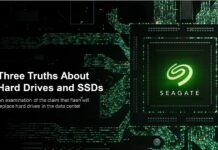Dell believes generative AI could be as transformative as server virtualization and drive increased compute, network and storage sales.
Execs presented to a bunch of financial analysts at an “Ask the Experts” Q&A event and said that generative AI would increase today’s $30 billion AI total addressable market (TAM) but didn’t say by how much.

Dell vice chairman and co-COO Jeff Clarke said: “GenAI is an inflection. It’s disruptive and it’s game-changing.”
The AI TAM is based on machine learning, deep learning and computer vision. Generative AI incrementally adds large language models (LLMs) with examples such as computer vision for manufacturing, machine learning for supply chain applications, and chatbots to improve customer satisfaction.
GenAI comes in two broad flavors: massive scale multi-functional models and domain and enterprise-specific models, which use smaller data sets. They latter can be trained with smaller clusters of servers and GPUs and perform inference at the edge with a single server, Dell reckons.
Clarke said: ”We will have AI factories at the edge, in the datacenter and in the cloud; in other words, everywhere resulting in a range of GenAI infrastructure solutions.”
Both types of GenAI will drive up demand for compute, we’re told, with more memory required, networking with high speed gigabit Ethernet and InfiniBand interconnects between storage and training server clusters, Fiber Channel and more.
Clarke said: “The compute will be fed by massive unstructured and object storage infrastructure driven by more and more data … Four Generative AI use cases have consistently risen to the top of CEO’s lists: customer operations, content creation and management, software development and sales.”
Generative AI models will need to be fed with data from both structured (block) and unstructured (file+object) data sources, Dell reckons. Real-time, near-time and archive data will be needed, with flash storage holding the real and near-time data. There will be more unstructured data capacity needed than structured, and unstructured data will be stored in very large scale, software-defined repositories.
Dell supplies PowerScale clustered file, also object storage, using its OneFS operating system. This is available on-premises and in the public cloud. It also has APEX Storage for the public cloud which has both block and unstructured data aspects.
The block storage is based on its scale-out PowerFlex hyperconverged infrastructure offering, which does not use VMware and its VSAN. The unstructured file and object storage is based on PowerScale.
Dell has two separate object storage products; Object Scale for edge and smaller deployments, and ECS for large-scale object deployment use. Neither is yet available in the public cloud.








